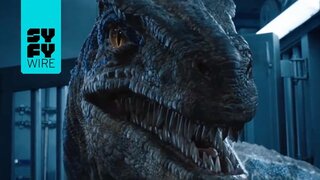Create a free profile to get unlimited access to exclusive videos, sweepstakes, and more!
Decoding Prehistoric Poop Reveals the Dinosaurs' Secret Origin Story
Scientists are figuring out how the dinosaurs rose to dominance, by sifting through their poop.
Paleontology, the study of prehistoric organisms, relies almost entirely on the fossilized remains of extinct plants and animals. We look at what’s left of their bones or the imprints left by leaves and other soft structures to figure out what ancient life looked like and how it lived. Now, researchers are looking in a less glamorous but highly informative place, dinosaur doody.
Plenty of attention has been paid to the reign of the dinosaurs and to their tragic demise 66 million years ago, but less is known about how dinosaurs became the dominant animal group and how they grew to such incredible scales. A recent study published in the journal Nature focused on coprolites (fossilized feces), cololites (the fossilized contents of digestive tracts), and fossilized regurgitates (vomit) to see what was eating what in the ancient world. These three sorts of fossilized excrement, collectively known as bromalites, helped scientists unravel the story of how dinosaurs rose to prominence more than 200 million years ago.
Who’s eating whom? How dinosaur droppings tell the story of their rise to power
A sick dinosaur was one of the earliest signs that something wasn’t quite right at Jurassic Park. Dr. Ian Malcom (Jeff Goldblum) was giving his famous water droplet lesson on chaos when doctors Grant and Sattler (Sam Neill and Laura Dern, respectively) jumped out of the tour vehicle.
They came across a sick triceratops lying in the brush. Her symptoms of imbalance, disorientation, labored breathing, and dilated pupils suggested poisoning from West Indian lilac. Of course, “there’s only one way to be positive,” Sattler said. “I’d love to see the dinosaur’s droppings.” When we later picked up with our intrepid friends, Dr. Sattler was elbow deep in dino dung, investigating the source of the illness. Modern paleontologists don’t have the benefit of fresh dinosaur droppings, but the fossil record provides the next best thing.
Researchers focused on fossil deposits in the Polish Basin, an area which is part of Central Europe today. When the dinosaurs first emerged 230 million years ago, it was part of the supercontinent Pangaea just like everywhere else. The first dinosaurs were relatively small and overwhelmed by the more diverse and more successful cynodonts (a group which would eventually lead to mammals) and large predatory reptiles. Over the next 30 million years, dinosaurs pushed those other groups to the side and adapted to fill previously occupied niches. The bromalites they left behind tell the story of how that happened.
Researchers investigated more than 500 bromalites distributed across the first 30 million years of dinosaur existence. Through chemical analysis, synchrotron microtomography, and other techniques, the team identified small insects, partially complete fish, and other preserved organic materials. That data, in addition to the size, location, and orientation of the bromalites allowed scientists to recreate the evolution of dinosaurs and their diets over time. In general, bromalites got larger over time as dinosaurs diversified and swelled in size. Meanwhile, the distribution of bromalites from dinosaur competitors were declining. In some cases, researchers even found dinosaur bromalites containing the crushed bones and teeth of non-dinosaurs, painting a clear picture of who was eating whom.
The dinosaur story begins with their direct ancestors, small omnivores which lived during the Triassic. Next, small theropods (two-legged carnivorous dinosaurs) emerged to feed on fish and insects. As the climate warmed in the Jurassic period, plant life exploded, and relatively small herbivorous dinosaurs used that surplus of resources to balloon in size. Massive plant-eating dinosaurs like the sauropods evolved and their carnivorous predators followed suit. In the process, dinosaurs became so large, so powerful, and so successful that they largely replaced those previously dominant groups. At least until an asteroid came to wipe the slate clean.
It turns out that you really are what you eat, and sometimes a good meal is the only record of your life that survives the ravages of time. Remember that the next time someone gives you a hard time for posting pictures of your food.
Watch Jurassic Park, streaming now on Peacock!































